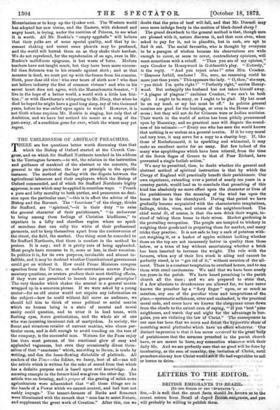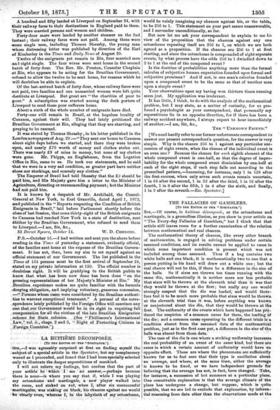LETTERS TO THE EDITOR.
BRITISH EMIGRANTS TO BRAZIL
[TO THE EDITOR OF THE "SPECTATOIL")
SIR, —It is well that the exact facts should be known as to the recent return from Brazil of duped British emigrants, and you will probably be willing to publish them.
A hundred and fifty landed at Liverpool on September 24, with their railway fares to their destinations in England paid to them. They were married persons and women and children.
Forty-four more were landed by another steamer on the 2nd instant ; their railway fares were not paid. Among these were some single men, including Thomas Sheasby, the young man whose distressing letter was published by direction of the Earl of Kimberley in the Times and Daily News of August 29.
Twelve of the emigrants yet remain in Rio, four married men 41.111 eight single. The four wives were sent home in the second batch of forty-four. The Rev. Mr. Preston, Consular Chaplain at Rio, who appears to be acting for the Brazilian Government, ,refused to allow the twelve to be sent home, for reasons which he will doubtless be able to explain.
Of the last-arrived batch of forty-four, whose railway fares were mot paid, two families and one unmarried woman were left quite destitute at Liverpool. But great are "the charities of poor to poor." A subscription was started among the dock porters of Liverpool to send these poor sufferers home.
About a sixth of the whole number of emigrants have died.
Forty-one still remain in Brazil, at the hopeless locality of Cananea, against their will. They had lately petitioned the Brazilian Government at Rio, alleging that they are starving, and praying to be rescued.
It was stated by Thomas Sheasby , in his letter published in the London newspapers of Aug. 29 :—"They sent our boxes to Cananea -about eight days before we started, and there they were broken open, and nearly 170 worth of money and clothes stolen out. There was nearly 29 of mine in money, but none of my clothes were gone. Mr. Phipps, an Englishman, from the Legation 'Office in Rio, came to us. He took our statements, and he said that we were in a very sad condition, as greater part have neither shoes nor stockings, and scarcely any clothes."
The Emperor of Brazil had told Sheasby that the 19 should be paid him, and His Majesty gave him a letter to the Minister of Agriculture, directing or recommending payment; but the Minister bad not paid him.
It is known by a despatch of Mr. Archibald, the Consul- 'General at New York, to Earl Granville, dated April 1, 1873, and published in the "Reports respecting the Condition of British Emigrants in Brazil," laid before Parliament shortly before the close of last Session, that some thirty-eight of the British emigrants -to Cananea had reached New York in a state of destitution, sent thither by the Brazilian Government, who refused to send them to Liverpool.—I am, Sir, &c., P.S.—October 16.—I had written and sent you the above before reading in the Times of yesterday a statement, evidently official, of the families sent home at the expense of the Brazilian Govern- ment. It has not, then, been my aim to set myself against an official statement of our Government. The list published in the Times of 164 persons must be the first arrival oi September 24, stated on my private information at 150. The official number is doubtless right. It will be gratifying to the British public to know that what has been now done has been done "on the pressing representations of her Majesty's Minister at Rio." My Brazilian experience makes me quite familiar with the formula
• clenying obligation, and implying voluntary, generous concession, —" Persons whose cases were considered by the Brazilian authori- ties to warrant exceptional treatment." A perusal of the corre- spondence lately published by the Foreign Office will convince any one that our Government would be in its right in requiring full compensation for all the victims of the late Brazilian Emigration scheme for State colonies. (See " Phillimore'e International Law," vol. ii., chap. 2 and 3, "Right of Protecting Citizens in l'oreign Countries.")



































 Previous page
Previous page